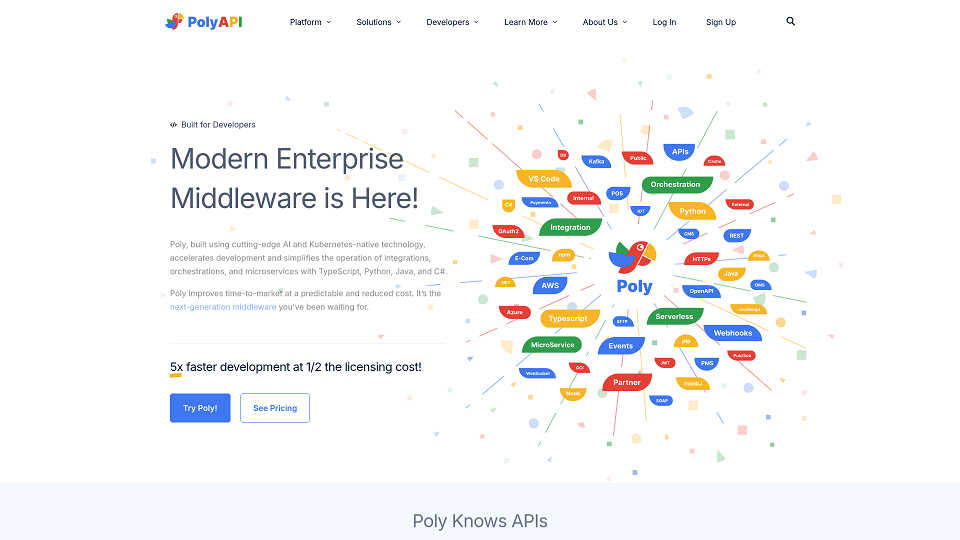PolyAPI
PolyAPI - Modern Enterprise Middleware
Kubernetes-native and built using cutting-edge technology and AI, Poly accelerates development and simplifies the operation of integrations.

PolyAPI Introduction
PolyAPI is a next-generation middleware platform designed to streamline and accelerate the development and operation of integrations, orchestrations, and microservices. Built on cutting-edge AI and Kubernetes-native technology, PolyAPI empowers developers with a comprehensive suite of tools and features to simplify complex integration processes.
Key Features of PolyAPI
PolyAPI offers a range of features that set it apart as a modern and efficient integration platform:
Native Development with SDKs
PolyAPI supports native development using Software Development Kits (SDKs) in popular programming languages such as Node.js, Python, Java, and C#. This allows developers to leverage their existing skills and preferred languages to build integrations seamlessly.
AI-Powered Assistant for Accelerated Coding
PolyAPI incorporates an AI-powered assistant that aids developers in function discovery and code generation. This intelligent assistant can suggest relevant APIs, generate code snippets, and provide insights to accelerate the development process.
Scalable Serverless Runtime
The platform provides a scalable serverless runtime environment that can be self-hosted in Kubernetes. This ensures that integrations can handle varying workloads and scale seamlessly based on demand, offering flexibility and cost-effectiveness.
Benefits for Enterprises
PolyAPI offers significant benefits for enterprises looking to streamline their integration strategies:
Faster Integration Delivery
With its intuitive interface and powerful tools, PolyAPI enables faster integration development, allowing businesses to respond to changing market demands and deliver solutions more rapidly.
Reduced Vendor Lock-in
By supporting multiple programming languages and offering a self-hosted option, PolyAPI reduces vendor lock-in, giving businesses greater control and flexibility over their integration infrastructure.
Cost Savings
PolyAPI's efficient design and flexible pricing models help enterprises reduce licensing costs compared to traditional integration platforms, leading to significant cost savings.
Target Customer Groups
PolyAPI caters to a wide range of customer groups, including:
- Enterprises with Complex Integration Needs: Businesses with multiple systems and a high volume of integrations can benefit from PolyAPI's streamlined approach and scalable infrastructure.
- Software Development Teams: Development teams looking for a modern and efficient way to build and manage integrations will find PolyAPI's intuitive tools and AI-powered assistance invaluable.
- Organizations Seeking Cost-Effective Solutions: PolyAPI's flexible pricing models and reduced licensing costs make it an attractive option for organizations looking to optimize their integration spending.
Pricing
PolyAPI offers various pricing plans to suit different needs, from a free trial to enterprise-grade options. The pricing is typically based on factors like the number of developer seats, API invocations, and the inclusion of features like always-on functions. Detailed pricing information is available on the PolyAPI website.
Summary
PolyAPI is a robust and innovative integration platform as a service (IPaaS) that empowers developers and enterprises to build, manage, and scale integrations more efficiently. Its AI-powered features, serverless runtime, and support for multiple programming languages make it a compelling choice for modern businesses. With its focus on speed, flexibility, and cost-effectiveness, PolyAPI is well-positioned to transform the integration landscape.
PolyAPI Frequently Asked Questions
What is PolyAPI?
PolyAPI is a modern enterprise middleware platform that accelerates development and simplifies the operation of integrations, orchestrations, and microservices. It is Kubernetes-native and utilizes cutting-edge AI technology.
What programming languages does PolyAPI support?
PolyAPI supports TypeScript, Python, Java, and C# for native development using SDKs.
How does PolyAPI's AI assistant help developers?
PolyAPI's AI assistant aids in function discovery and accelerates coding by providing intelligent suggestions and generating code examples.
Can PolyAPI be self-hosted?
Yes, PolyAPI offers a self-hosted option for companies that prefer to manage the platform on their own infrastructure. It provides unlimited seats, a generous invocation limit, and professional services options.
What is the pricing model for PolyAPI?
PolyAPI offers flexible pricing plans, including a free trial, a starter plan, a growth plan, an enterprise plan, and a self-hosted option. Each plan comes with different features and invocation limits. They also have a custom pricing model for hotels based on a per-room, per-month rate.
What are Always On Functions in PolyAPI?
Always On Functions are server functions in PolyAPI that are designed to remain active and responsive at all times. This eliminates the need for them to be "woken up" and ensures low response times.
What APIs does PolyAPI come pre-trained on?
PolyAPI is pre-trained on a wide range of popular APIs, including those from Adyen, Apaleo, Salesforce, Oracle Food and Beverage, Oracle Hospitality, Asana, Github, Hubspot, Slack, Google Workplace, Stripe, Twilio, and Shopify.
How does PolyAPI handle error handling during operation?
PolyAPI provides an error event stream that allows for programmatic error handling and alerting. This enables developers to build robust and resilient integrations.
What are the benefits of using PolyAPI for enterprise integration?
PolyAPI offers several benefits for enterprise integration, including faster integration delivery, an expanded talent pool, reduced vendor lock-in, and significant cost savings on expensive licenses.
Does PolyAPI provide documentation and support?
Yes, PolyAPI offers comprehensive documentation, a Discord channel for community support, and professional services options for customers who require assistance with implementation or development.